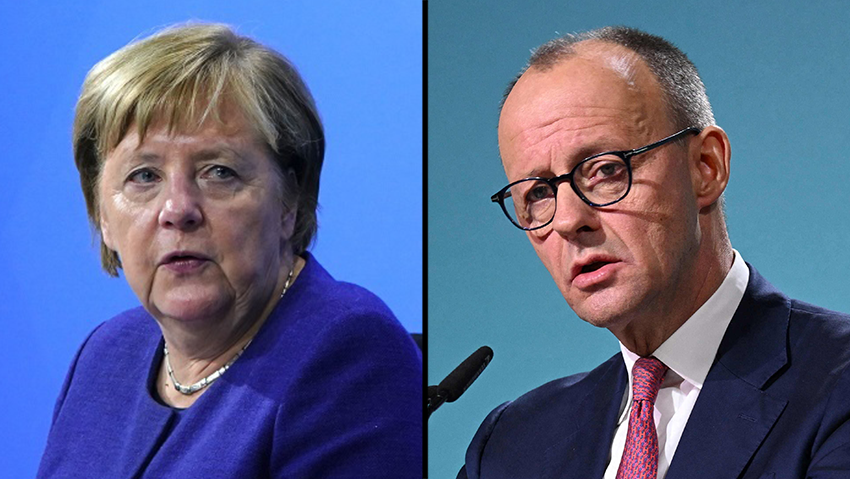Getting your Trinity Audio player ready...
Years after clashing with Angela Merkel and being politically sidelined by her during her tenure as leader of the Christian Democratic Union (CDU), Friedrich Merz, now 69, is positioning himself for a dramatic political resurgence. As leader of Germany’s center-right party, Merz is poised to lead the CDU back to power, three years after its electoral defeat following Merkel’s retirement.
The no-confidence vote on Monday against Chancellor Olaf Scholz’s Social Democratic government, set the stage for snap elections on February 23, with the conservatives under Merz enjoying a commanding lead in the polls.
Olaf Scholz, at risk of being ousted, meets PM Netanyahu
(Video: GPO)
Merz represents a stark departure from Merkel’s leadership style and persona. Unlike Merkel, who hails from East Germany, Merz comes from the western part of the country, where he still resides. He is married to his childhood sweetheart Charlotte, a judge, and is a father of three and a grandfather. A devout Catholic, Merz does not shy away from showcasing his wealth, frequently traveling aboard one of his two private jets—an image in sharp contrast to Merkel’s understated lifestyle.
The history between Merkel and Merz is anything but amicable. Once regarded as Merkel’s most formidable political rival within the CDU, Merz was elected to parliament in 1994 and gained prominence as an expert in economics and law. However, Merkel, who reportedly referred to him as an “enemy,” successfully ousted him from the party leadership in 2002, clearing her own path to becoming chancellor three years later.
Marginalized within the party, Merz eventually withdrew from politics in 2009 and built a fortune as an investment banker. His political comeback coincided with Merkel’s retirement in 2021, and he reclaimed the CDU leadership in 2022.
Despite his political resurgence, Merz remains a polarizing figure. He has never been a charismatic leader who inspires mass appeal, and he describes himself as “socially conservative and economically liberal.” His current political momentum owes less to his own abilities and more to widespread dissatisfaction with what many perceive as the Scholz government’s mismanagement.
As Merz and his party prepare for the upcoming elections, they will emphasize qualities that resonate with German voters: discipline, precision, hard work, and a sense of purpose. However, his opponents are expected to highlight his controversial outbursts, past remarks about immigrants, and his tax policies—traits and positions that have led some to draw comparisons between Merz and Donald Trump, whose populist style is deeply unpopular in Germany. A member of the CDU’s conservative wing, Merz has previously championed the idea of a “leading culture,” advocating for Muslim immigrants to adopt German traditions and values.
In addition to grappling with Germany’s immigration challenges and an emerging economic crisis—affecting even corporate giants like Volkswagen—Merz will face scrutiny over his stance on the Russia-Ukraine war. Trump's election win could force Germany and other European nations to ramp up economic support for NATO. Merz has pledged to increase Germany’s support for Ukraine, but such a commitment would require Germany to borrow funds, forcing him to abandon the CDU’s traditional fiscal conservatism and its focus on reducing budget deficits.
2 View gallery


Merz speaks to the Reichstag before the no-confidence vote
(Photo: REUTERS/Lisi Niesne)
Merz is a staunch supporter of the European Union and its collaborative framework. However, to counter the growing appeal of the far-right Alternative for Germany (AfD)—which currently polls at 18%, making it the second-largest party after the CDU’s 32%—Merz has steered the CDU away from Merkel’s “open-door” refugee policy. In doing so, he has adopted or echoed aspects of the AfD’s platform on immigration, including stricter border controls and more rigorous vetting procedures.
Get the Ynetnews app on your smartphone: Google Play: https://bit.ly/4eJ37pE | Apple App Store: https://bit.ly/3ZL7iNv
Despite calls from some within his party to consider a coalition with the AfD, Merz has categorically ruled out such an alliance. He has drawn a sharp distinction between the two parties, stating, “The difference between us is the difference between nationalists who love their country and hate everyone else, and patriots who love their country but respect others.”
Where does he stand on Israel?
Since October 7, Merz, like nearly all CDU members, has expressed unwavering support for Israel and its right to self-defense. He has pledged to take a tougher stance against violent and antisemitic demonstrations in Berlin, promising stricter enforcement and harsher penalties for antisemitic incidents.
Marking the one-year anniversary of the October 7 massacre last month, Merz delivered a scathing speech in parliament, criticizing the Scholz government for what he called its hypocrisy. He accused the government of paying lip service to Germany’s solidarity with Israel while failing to supply weapons and spare parts without imposing conditions to ensure they are not used for alleged war crimes. Merz has previously stated that “Germany’s relationship with Israel is unique—without any ifs or buts.” While he supports a two-state solution, he insists it must be contingent on Palestinian recognition of Israel’s right to exist.





